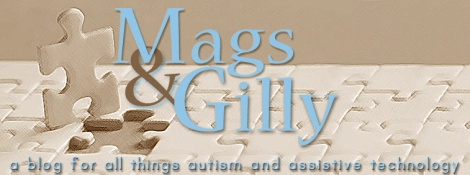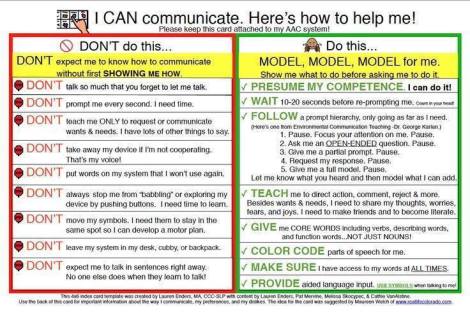July 15, 2016
Memes, Posters and Little Laminated Things…..
Today I wanted to share of some of my favorite posters and memes from social media sites that relate to supporting AAC users and AAC implementation. A few months ago, Rachael Langley AAC Specialist, created this fabulous subway style poster of inspiration to hang in the classroom (click here or on the poster image for link to high resolution PNG file from dropbox. Thank you for sharing Rachael!):
I liked this one so much I made an adapted version for my own home (with Rachael’s permission of course!) with PhotoShop and a little kraft paper card stock (click here or on image for link to PDF).
Another poster I love is this “Getting AAC Users COMMUNICATING” AAC Boot Camp chart of do’s and don’t do’s by Lauren S. Enders, MA, CCC – SLP. Lauren is an SLP, AAC, AT specialist guru extraordinaire with one of the largest AT / AAC treasure trove pinterest archives ever as blogged about previously here in my series on our love of core vocabulary. It doesn’t matter whether the AAC system is low tech or high tech, there are valuable reminders about the importance of modeling language, presuming competence and giving adequate wait time when in a communicative exchange with an AAC user.

Along with the boot camp poster, Lauren also adapted the poster as a 4 x 6 card that can be laminated and placed on the back of an AAC users device to remind communication partners of some of the same important fundamentals on the go and in the moment. Conference organizers handed out over 150 of these laminated cards to attendees at the first annual Michigan AAC conference, now known as the #TalkingAAC conference. It was also a popular post on the Assistiveware Facebook page.
Facebook posting, tweeting and pinterest sharing of memes is another powerful way to get us all thinking about AAC advocacy and best practices to help build powerful communication skills. Love this one inspired by wise words from Kate Ahern and found on Lauren Ender’s pinterest board of many AAC memes and posters. See gallery below for some other favorite AAC memes from Pinterest.












~KVS
“For I know the plans I have for you,” declares the Lord, “plans to prosper you and not to harm you, plans to give you hope and a future.” ~Jeremiah 29:11.
July 6, 2016
HumpDay Hop Back….IEP Advocacy
Yesterday I found myself digging on the computer, looking at old files. I came across a powerpoint I had made for Magdalyn’s IEP team in 2009 as she was finishing up Kindergarten. It was the first year she ever had access to general education peers since starting special education services. It made a huge difference in her ability to be flexibile and relate more to other students.
One of the biggest pieces of advice I can give to other parents is that YOU are EQUAL MEMBERS of the IEP TEAM. No one knows your child better than you. Often it can be helpful to write down your thoughts about child’s needs, progress, and concerns. Brag. Revisit. Be Proud. Share your ideas.
The U.S. Department of Education says the following about parents as IEP team members:
Parents are key members of the IEP team. They know their child very well and can talk about their child’s strengths and needs as well as their ideas for enhancing their child’s education. They can offer insight into how their child learns, what his or her interests are, and other aspects of the child that only a parent can know. They can listen to what the other team members think their child needs to work on at school and share their suggestions. They can also report on whether the skills the child is learning at school are being used at home.
You don’t have to be a public speaker to create some materials for your child’s IEP team meeting. Write down everything you would like to be known and be recorded in the document about your child. It can be copied and pasted into the IEP document and become part of the permanent written record in the legal document. Bring along a photo of your child and place it on the table so that everyone remembers who the meeting is about: your child.
Below is the powerpoint I created for Magdalyn’s IEP meeting as she was leaving Kindergarten and entering First Grade. Included are pictures from babyhood to the current day along with examples of some her academic skills and products of her learning experience. The final slides include parental input for her needs and also possible IEP goals emphasis.
~KVS
“For I know the plans I have for you,” declares the Lord, “plans to prosper you and not to harm you, plans to give you hope and a future.” ~Jeremiah 29:11.





